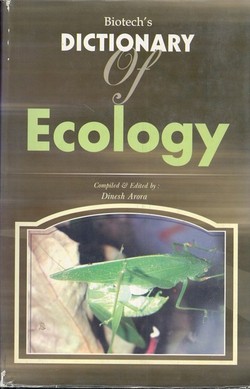
Biotech’s Dictionary of Ecology
By
Dinesh Arora
The term “dictionary” for a layman means reference books that consist of words along with their meanings. And, when one talks of a dictionary, he or she is implicitly understood as referring to a dictionary of English words. But unlike what our minds are tuned to think, a person who is talking about a dictionary might just be talking about a glossary of terms belonging to particular subject. This is exactly where our series comes in the picture. The series consists of dictionaries on varied subjects, ranging from common topics like commerce and botany, to very profound and complicated subjects like Entomology and Toxicology. The use of simple and easily comprehensible language, along with real life examples and appropriate pictures, fosters an enriching learning experience for the readers, thereby making each and every volume a must buy.
Preface:
“Ecology” as understood is the study of livings and deeds in their ecosystems. It is a huge subject that includes many of the rules and laws set up within physics, chemistry, geology, oceanography, physiology and biology. Ecosystem is the relationship between living and non-living things in different environments, whether humans, animals or plants, coexist and interact with each other.
The science of ecology is concerned with relationships between living organisms: plants, animals, microorganisms and their environment. Ecologists study the way in which organisms, populations, communities and ecosystems function, and is so doing also draw on many other areas of biology including genetics, evolution, physiology and behaviour. Ecology is thus a challenging and diverse subject. Here, a wide range of environmental disciplines, ranging in scale from the gene to whole Earth systems have been specially highlighted. The aim is to improve our understanding of both the environment and the processes that underlie the Earth’s support systems. Moreover, the impacts of human activity on natural environments are particularly stressed. Therefore, it is necessary to generate practicable solutions to today’s pressing environmental problems, so that a healthy, wealthy and sustainable environment can be enhanced and maintained.
Vibrant neighborhoods are the building blocks of healthy cities and thriving regions. Ecology uses urban as well as rural design, land use planning and policy reform to help people plan and build communities that are ecologically healthy, socially just and economically fair.



ساحة النقاش